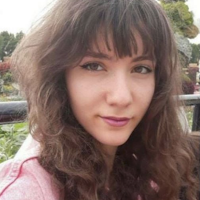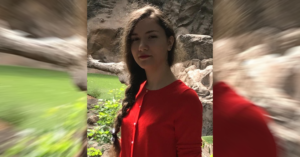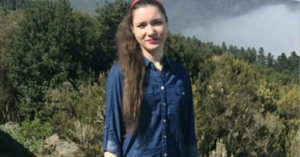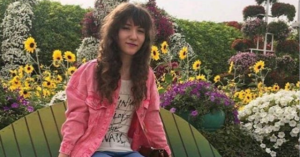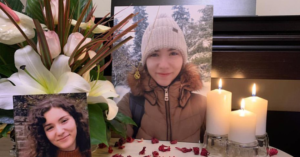Pegah Safarpoor Koloor
Give Me Pegah’s Transcripts
The soldier was sitting by a little mound, his AK47 resting on his knee, when he saw from afar that the woman was on her way back. He knew the woman. He raised his hand to his breast pocket to ensure the piece of paper was secure. He didn’t want to discuss the paper with anyone – especially not with the woman who was coming.
The woman walked slowly. As she walked, she seemed to be crying. Heavy, heavy, heavy. The soldier knew the woman was coming after him. He also knew he had to get up.
“Hello.”
“Hello.”
“I want to tour the inside.”
“It’s forbidden, ma’am.”
“Not for me.”
Here we go again, the soldier thought with himself.
“It’s forbidden, ma’am,” he said. “Can’t you see the camera?”
“How come it wasn’t forbidden on the first day?” the woman demanded. “Or on the second? When they took everything away? Do you want me to tell you what they did?”
The soldier knew the story and he knew the woman would tell him the story again. In her hands, she held a picture of a beautiful girl with auburn hair, tall, with piercing eyes. Beneath the picture was written in Persian: Pegah Safarpoor. The soldier knew both the woman and the picture. He had seen her around enough by now that it would be impossible not to know her.
“I am Marjan,” she said. “mother of Pegah. I’ve told you a hundred times. I have to go and have a look inside.”
The soldier glanced behind him. There was no commander. The soldier knew all that had happened here. Three months ago, a plane had crashed in this place. The commander had said it was Israel. Was it Israel, or the US? The soldier couldn’t remember. But this woman, Marjan, said: “They did it themselves, son. They’ve admitted it on TV. But they don’t say why they did it. You know what murder is? This is murder. Murder. My Pegah was just coming here to get her transcripts. The university had asked for them.”
The soldier didn’t like to watch the news. He had to guard his AK47. He knew there was a decrepit park behind him where the devastated plane had fallen. He could still trace the blood on the ground and the walls. “Go and have a look,” he told the woman, “but make it quick. Don’t go near the cameras, please. I’d be held responsible.”
Marjan, pressing the photo on her chest, shook her head to thank him and started toward the wasteland. She saw sunflowers growing on the walls of the garden. She saw a colorful scarf attached to a thorn-covered branch, waving in the wind. She thought of Pegah. Her beautiful little girl. She thought of January 17, 1999, when Pegah, her eldest, had been born at Tehran’s Madaran Hospital.
“How beautiful this child is. Not like the other babies.”
Her smell! The lost scent of Pegah gripped her. Her little, brittle hands; her soft, narrow shoulders; her hair, all messed up in the wind. Pegah didn’t go to the high-ranking Farzanegan school because she wanted to stay in the same class as Mahshid. Then Pegah left Azad University’s medical branch in Tehran to study pharmacology in Canada. “Mother! I got an offer.”
The sentence now reverberated in her head. She couldn’t raise her eyes off the ground. “I got an offer! An offer!” Stomping on the ground. Happy. That sense of release, that freedom.
On the tenth day, she found Pegah’s sandals: a pair of polka-dotted sandals she had stuffed into the girl’s suitcase herself. She refused to take her eyes off the ground until she spotted the sandals where they had fetched up under a little bush. When she saw them, she cried out. “My child! You didn’t take your sandals. My child!” She grabbed them, not even bothering to dust them off, and she touched her face with them. The embroidered dots had come undone, but she knew this pair. She dashed all around them, searching. She was crying while running, like Jacob holding Joseph’s shirt to his face. “Here they are! I found the other pair.” Marjan couldn’t hold herself upright any longer and dropped to the ground. A song, by Rihanna or perhaps Maloma, a favorite of Pegah’s, lurked in her head. So did the faces of Pegah’s little kittens, who were now orphans. The little suitcase, the case of cosmetics, the fragrant perfumes. Now she wanted to rub the sandals on her eyes.
“What did you do with the rest of their stuff? They’re all here.”
The commander didn’t respond. He looked distastefully at the dusty sandals, as if they were a handful of rubbish.
“Leave, ma’am! Leave. This is a military zone.”
“It wasn’t a military zone on the first day,” Marjan said. “How about on the second day?”
The soldier had returned. “Ma’am, please leave the premises. You have to get out of here.”
Later, he told her they had burnt the rest of the scattered possessions. Among them had been torn dolls, papers and clothes.
“The commander said we had to ‘perish’ them, or something like that,” he told her. He hadn’t quite understood what his superior wanted but assumed that if the commander wanted something done, it had to be pretty bad. What was this act of ‘perishing’ that the commander approved of but that Marjan, Pegah’s mother, would see as a crime? He wished he had studied more. But the soldier had been able to pick up a piece of paper from the flames and put it in his pocket. Others had run off with rings, bracelets and dollar bills. But this little piece of paper was enough for him.
Now the soldier could see that Marjan, with a picture of her daughter on her chest, was hunting among the thorn bushes. He didn’t know what Marjan was looking for, though he knew the words of this woman, who came here every day, by heart now: “Pegah knew Spanish. Knew Turkish. She spoke English and Persian. In Toronto, they thought she was Canadian. They wanted her to be a model. But she said ‘I am Iranian and I don’t want to be a model.’ She had come to get her transcripts so York University would accept her. She had come to get her transcripts.”
The soldier knew that when the woman next came back, she would say: “I’m looking for pink quartz stones. They were her favorite stones. I don’t know why but maybe they couldn’t ‘perish’ this. Who ‘perishes’ a stone? It was in Pegah’s suitcase. I’m looking for her transcripts. Can I go and see the place where they burnt the stuff?”
And he had to say no, since there was nothing there for the woman to find.
Marjan came back. “I was a high school teacher in District 17. Her father owned the Taat furniture factory. This kid grew up in wealth and comfort. She was the envy of her younger sisters. She was like a mother to them. Didn’t I have the right to have her stuff back? They killed my Pegah. Wasn’t it my right to find the transcripts on the ground?”
The soldier didn’t know why, but he wanted to cry. He didn’t know how to cry anyway. He didn’t know what crying meant. He only knew he had to watch over his AK47 so that this goddamned conscription period would finish sooner.
“The films she watched are still in her room,” Marjan said. “Her CDs… Forest Gump… Kubrick’s films. Her Harry Potter books are still on the shelves. I can’t even dust them off. I want to die for you, my child.”
The soldier didn’t understand. But he could feel something move in his heart. Marjan knew she had to leave the desert and end her search there. The soldier watched the woman leave, crying as she went. Further, further, further.
When she was far enough away, the soldier pulled the little piece of paper out of his chest pocket. It was in English. He couldn’t read it but later, he asked someone who spoke English to read it for him.
Transcripts of General Biology, Islamic Azad University, Tehran Medical Branch.
And underneath, a name with a larger font, also in English:
Pegah Safarpoor.
Writer: Hamed Esmaeilion
Translator: Arash Azizi
Editor: Hannah Somerville
With the support of IranWire
